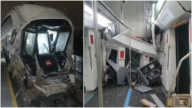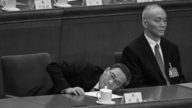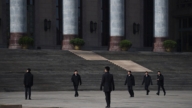【新唐人2013年03月30日訊】28號,國務院辦公廳下發有關:實施《國務院機構改革和職能轉變方案》任務分工的通知。通知說,用3到5年時間,完成《方案》提出的各項任務,並且依年限列出各階段任務。但民眾反饋說,看了半天,仍然看不出「改革」的實質內容,專家也懷疑能否奏效﹖所謂「國務院機構改革」,是不是像專家所說是「治標不治本」的改革﹖或是「新官上任三把火」的舉動,一起和本臺記者去了解。
國務院通知實施的《機構改革和職能轉變方案》任務,共分為4項,如2013年應完成的任務,包括組建中國鐵路總公司等29項;2014年共28項應完成的任務,包括:下放一批國家採用補助、貼息等方式扶持地方的項目。
還有2015年完成的任務,共11項;2017年完成的任務,共4項。
網友(佛山飄歌)說:看了半天,仍然看不出「改革」的實質內容。
而時事評論員藍述表示,中共政權在過去30年所謂的改革開放中,整個經濟發展,如GDP增長,都是政府大規模的盲目投資,很多重復的項目難以為繼,造成巨大的浪費。藍述說,這就是中共目前不得不面對的問題。
時事評論員藍述:「鐵道部實際上就是一個虧損巨大的國營企業,這次它要把它公司化,這就是一個最典型的例子。機構精簡了,從而造成經濟大規模下滑,到那個時候,導致中共執政合法性危機進一步加劇的時候,在那個時候,它還會不會繼續它現在所高喊的這種機構改革,和對項目的上馬進行嚴格的控制等等,就是大家拭目以待的問題。」
藍述認為,中共政權缺少透明性,又不進行體制改革,權力一直以來沒有受到監督,這是機構改革無法奏效的最根本問題。
另外,美國「南卡羅來納大學」經濟學系教授謝田也表示,大陸國務院最近出臺的機構改革、職能轉變方案,仔細看的話,實際上出不了「新官上任三把火」這樣的舉動。
美國「南卡羅來納大學」經濟學系教授謝田:「因為呢,我想任何一個官僚在任何一個位置上,不管他是民選的、還是專制的、還是任命的,他總是想有所突破。做出自己的一些成績,跟他前任有所區別。尤其是在胡溫體制之下,中國的經濟現在是千瘡百孔,債務纍纍,負擔沉重。如果想擺脫這個局面,清除自己的包袱,他們也必然會在機構改革和職能轉變方面做一些努力。」
謝田預計國務院這種枝節上的改革,治標不治本,注定不會產生任何效果。
謝田:「比方說,它現在說2013年要完成的任務,據說有二十九項,大部分屬於嚴格控制呀,控制審批呀、審核呀、合併呀、減少一些投資項目呀,下放一些,分權一些,說來說去這都是治標不治本的做法。中共國務院不動產登記條例也是,我想中共政府出臺這個呢,顯然是想安撫中國民眾,讓人們不會那麼憤怒。」
謝田說,中國的房地產都是被控制的,大量的房地產都在中共貪腐的官員名下,在既得利益集團手中,中國老百姓對此已經深惡痛絕。
謝田:「一方面一個……哪怕是一個中下級的官員,都會有十幾到二十幾套房子,對於老百姓來說呢,他們可能不吃不喝四十五年才能買得起一棟房子。顯然這種狀況是不能夠持續下去的。所以他出臺的條例,與其說是真正想整頓房地產市場呢,我認為不過是做出一個姿態給老百姓展示一下他們這個安民、撫民的一個心願。」
謝田認為,中國的體制改革,如果不「治本」,不把共產黨這個專制體制從根子上拔掉的話,目前國務院這種頭痛醫頭,腳痛醫腳的辦法,注定不會實現真正的政治改革。
採訪/朱智善 編輯/周平 後製/周天
CCP Publishes Tasks Timetable of Institutional Reform
On March 28, the General Office of China State Council
published a task allocation notice of implementing
“The Program of Institutional Reform and
Functional Transformation of the State Council”.
It said that it will take three to five years to complete
all tasks in the program, and will list the schedule by year.
But the Chinese people said that they didn’t find any
solid content about reform in the program.
Experts also doubted the effectiveness of the program
Is this so-called “State Council Institutional Reform“ a “palliative” reform?
Or is it just an action of “new leader lights three fires
after taking office”? Let’s see the report!
There are four tasks of the State Council’s institutional
reform and functional transformation program.
For example, tasks for 2013 include setting up
the China Railway General Company and 28 other tasks.
There are 28 tasks in 2014 which include a launch of projects
to support local government by giving subsidies and deduction related interest, etc.
There are 11 tasks in 2015, and 4 tasks in 2017.
Foshan Piaoge, a netizen said: “I didn’t find any solid content
about reform although I read it for a long time.”
Lan Shu, a political commentator said in the past 30 years,
the period of so-called Reform and Opening-up,
the CCP regime has controlled the whole economy .
It has launched many large scale investments
which were only for a GDP number.
Many projects are overlaid, resulting in a huge amount of waste.
Lan Shu says this is the problem the CCP has to face today.
Lan Shu, political commentator: ”The Ministry of Railways
is actually a huge loss-making state-owned enterprise.
It’s a typical example that it was changed into a company.
Streamlining the organization will lead the economy to
decline dramatically.
Furthermore it will lead the crisis of legitimacy of
the CCP’s rule to become worse and worse.
At that time, can the CCP chance this kind of reform
any more ? Will it strictly control coming projects?
These are the points that people should focus on.”
Lan Shu thinks that the CCP rule lacks transparency
and system reform.
Its power hasn’t been monitored for such a long time
and this is the most fundamental reason for institutional reform not being effective.
In addition, Xie Tian, an economics professor from the U.S.
University of South Carolina said that if we look it carefully,
we will find that the newly published program of
institutional reform and functional transformation
is still the “A new official applies strict measures.”
Xie Tian: “I think every official, no matter if he is
voted in by people, or despotic, or appointed,
always wants to achieve a breakthrough, to have achievements
which will distinguish him from his predecessor.
Especially in the Hu-Wen system, China’s economy was
riddled with debt, and a heavy burden.
To get rid of this situation, to ease the burdens,
the CCP’s new leaders have to make some effort on
institutional reform and functional transformation.”
Xie Tian expects that the reform of the State Council
is merely a palliative, and destined to have no real effect.
Xie Tian: “For example, it said that it will finish 29 tasks
in 2013, most of which are strict control, control approval,
audit, merge, reduce the number of the investments,
it will authorize some power to lower level,
decentralize powers, but all of these are palliatives.
It’s obviously a solution to appease Chinese people,
and stop them being so angry.”
Xie Tian said that China’s real estate market is controlled,
a large number of real estate belongs to corrupt
CCP officials, and in the hands of vested interests’ groups.
Chinese people have always hated it deeply.
Xie Tian: “On the one hand, even a subordinate official has
one or two dozen sets of real estate, but as for ordinary people,
they only have enough money to buy real estate after
45 years’ of hard work without eating properly.
Things obviously can’t go on like this,
and then it published the program.
It doesn’t really want to straighten out
the real estate market.
I think it just wants to put on a show for the
Chinese people in an attempt to keep them calm.”
Xie Tian thinks China’s system reform doesn’t “cure
the root”, doesn’t remove the dictatorship from its root,
the State Council’s current advice applies cure the head
when the head is aching, cure the foot when it is in pain
this solution is destined to fail in realizing true reform.


























